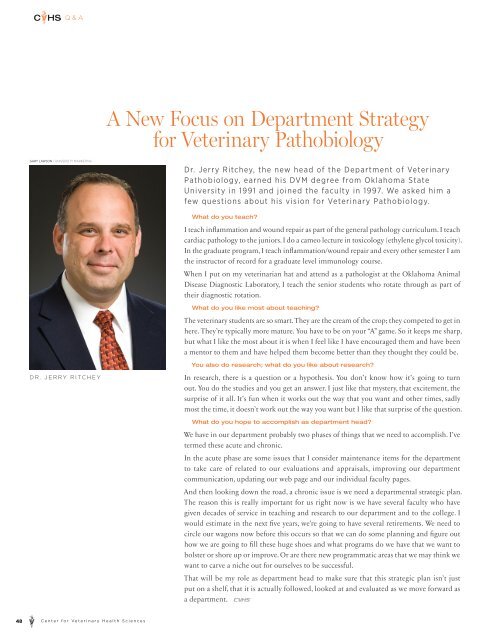Vet Cetera magazine 2015
Official magazine of the Center for Veterinary Health Sciences at Oklahoma State University
Official magazine of the Center for Veterinary Health Sciences at Oklahoma State University
Create successful ePaper yourself
Turn your PDF publications into a flip-book with our unique Google optimized e-Paper software.
Q&A<br />
A New Focus on Department Strategy<br />
for <strong>Vet</strong>erinary Pathobiology<br />
GARY LAWSON / UNIVERSITY MARKETING<br />
Dr. Jerry Ritchey, the new head of the Department of <strong>Vet</strong>erinary<br />
Pathobiology, earned his DVM degree from Oklahoma State<br />
University in 1991 and joined the faculty in 1997. We asked him a<br />
few questions about his vision for <strong>Vet</strong>erinary Pathobiology.<br />
What do you teach?<br />
I teach inflammation and wound repair as part of the general pathology curriculum. I teach<br />
cardiac pathology to the juniors. I do a cameo lecture in toxicology (ethylene glycol toxicity).<br />
In the graduate program, I teach inflammation/wound repair and every other semester I am<br />
the instructor of record for a graduate level immunology course.<br />
When I put on my veterinarian hat and attend as a pathologist at the Oklahoma Animal<br />
Disease Diagnostic Laboratory, I teach the senior students who rotate through as part of<br />
their diagnostic rotation.<br />
What do you like most about teaching?<br />
The veterinary students are so smart. They are the cream of the crop; they competed to get in<br />
here. They’re typically more mature. You have to be on your “A” game. So it keeps me sharp,<br />
but what I like the most about it is when I feel like I have encouraged them and have been<br />
a mentor to them and have helped them become better than they thought they could be.<br />
You also do research; what do you like about research?<br />
DR. JERRY RITCHEY<br />
In research, there is a question or a hypothesis. You don’t know how it’s going to turn<br />
out. You do the studies and you get an answer. I just like that mystery, that excitement, the<br />
surprise of it all. It’s fun when it works out the way that you want and other times, sadly<br />
most the time, it doesn’t work out the way you want but I like that surprise of the question.<br />
What do you hope to accomplish as department head?<br />
We have in our department probably two phases of things that we need to accomplish. I’ve<br />
termed these acute and chronic.<br />
In the acute phase are some issues that I consider maintenance items for the department<br />
to take care of related to our evaluations and appraisals, improving our department<br />
communication, updating our web page and our individual faculty pages.<br />
And then looking down the road, a chronic issue is we need a departmental strategic plan.<br />
The reason this is really important for us right now is we have several faculty who have<br />
given decades of service in teaching and research to our department and to the college. I<br />
would estimate in the next five years, we’re going to have several retirements. We need to<br />
circle our wagons now before this occurs so that we can do some planning and figure out<br />
how we are going to fill these huge shoes and what programs do we have that we want to<br />
bolster or shore up or improve. Or are there new programmatic areas that we may think we<br />
want to carve a niche out for ourselves to be successful.<br />
That will be my role as department head to make sure that this strategic plan isn’t just<br />
put on a shelf, that it is actually followed, looked at and evaluated as we move forward as<br />
a department.<br />
48 Center for <strong>Vet</strong>erinary Health Sciences


